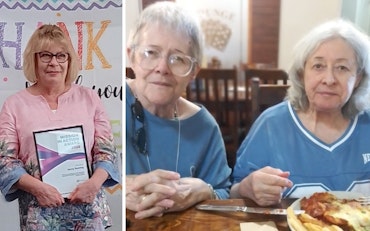Dysphagia – a difficult diagnosis to swallow
Not enough Australians are aware of the dangers of dysphagia, also known as swallowing difficulties, according to Speech Pathology Australia.

Fifty percent of stroke survivors and 84 percent of people with dementia experience swallowing difficulties, known as dysphagia. (Source: Shutterstock)
Pronounced ‘dis-fay-ja’, the condition affects both young and old, and represents a significant risk to people’s safety and wellbeing.
‘Dysphagia: A difficult diagnosis to swallow!’ is the theme of this year’s Swallowing Awareness Day on 13 March.
“Swallowing while eating and drinking is something we do around 500-700 times a day without thinking about it,” Dr Julie Cichero from the University of Queensland says.
“We trust that food, drink, saliva and medicine will pass through our mouth, throat and oesophagus, and arrive safely in our stomach.
“Yet, for around eight percent of the population, this simple act is a problem because food and drink gets into their lungs and causes chest infections like pneumonia. Sometimes this problem is so severe that regular food and drink can become a life-threatening choking risk.”
While Australians are alert to the choking risks for small children, few know the danger of choking on food is seven times greater for people aged over 65 years than those aged 1-4 years.
According to Speech Pathology Australia, 50 percent of stroke survivors and 84 percent of people with dementia experience dysphagia. Chewing and swallowing problems affect 30-50 percent of residents in aged-care facilities, with choking being the second-highest cause of preventable death.
Dr Chichero says speech pathologists are often the professionals who assess and manage dysphagia.
“To keep Australians with swallowing problems safe, food and drinks are often changed so that they are easier and safer for swallowing,” she adds.
“Based on a clinical assessment by a speech pathologist, foods are chopped, minced or pureed and drinks are thickened.”
The NSW Ombudsman’s Reports into reviewable deaths of people with disability in residential care (2012–2013 and 2014–2017) indicate that improving identification and management of swallowing risks, and better communication about food textures that are safe for people with dysphagia are some of the keys to preventable choking deaths.
From 1 May 2019, new guidelines will be introduced in Australia to standardise the names and descriptions of food and drink used in medical and community settings to reduce choking risk.
The new guidelines include easily accessible testing methods that allow consumers, health professionals, nursing homes and hospitals to check that the food or drink they are serving is suitable for older Australians with swallowing difficulties.
The guidelines have been developed by The International Dysphagia Diet Standardisation Initiative(IDDSI), which Speech Pathology Australia is actively supporting.










